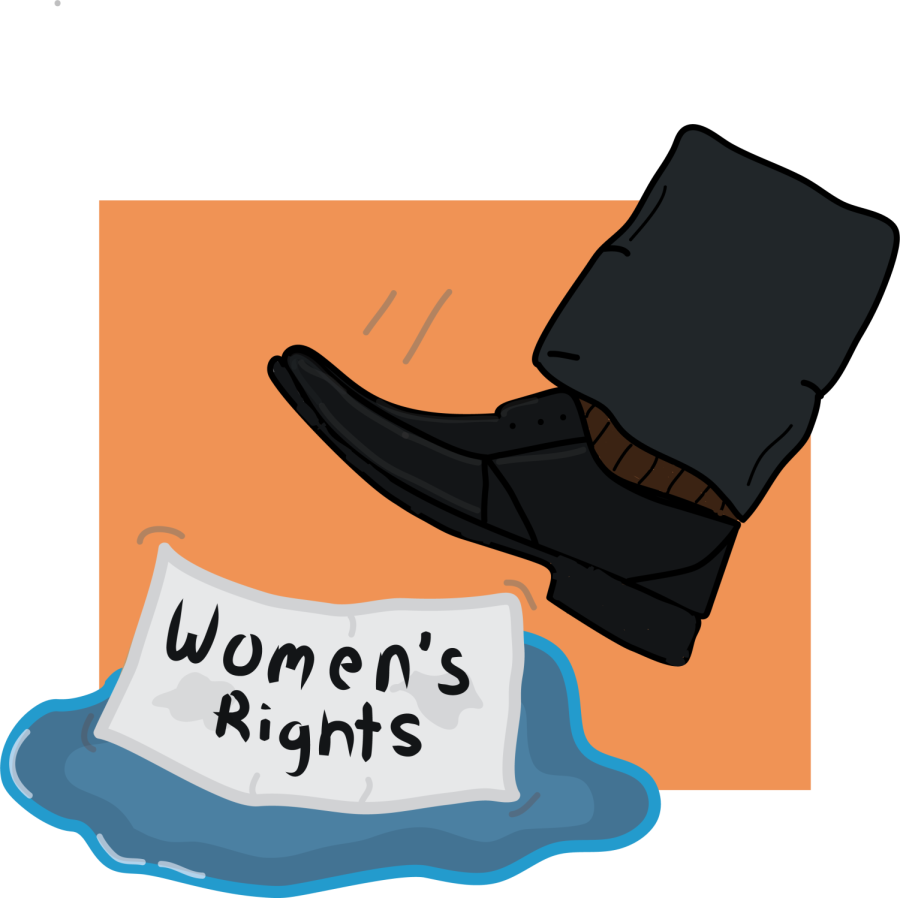Women’s rights are being demolished
With Roe v. Wade now overturned, every women’s rights and liberties are now at stake
Our first step in solving this crisis is to support candidates who favor women’s right to choose and vote to elect these representatives. Only when legislation is passed at the federal level can we begin to breathe a sigh of relief that these rights are being restored.
It’s June 24, 2022, all is well until you are taken aback by the sudden news that the Supreme Court has overturned Roe v. Wade. After hearing this, you come to the stark realization that women in America now have fewer rights than their mothers and grandmothers did. This follows the majority opinion in the Dobbs v. Jackson Women’s Health Organization case. This case effectively crushed Roe v. Wade, and has ultimately taken away a women’s right to abortion. Instead of protecting American’s rights, the Supreme Court now seems determined on taking them away.
Now, the rights of all women, and indeed those of all Americans, have suffered a tremendous blow. Rights and liberties that we assume are related to private and personal decisions, are now being threatened by the highly conservative Supreme Court, with six out of nine court justices making up the conservative majority. Human beings should have the right to their own bodies and the right to make their own choices.
First of all, there are many situations where women must choose abortion to save their own life. For example, the American Cancer Society notes that some cancer treatments are harmful to the fetus, particularly chemotherapy in the first trimester. This limitation on the timing and nature of cancer treatment can prevent the effective treatment of cancer of the woman, putting her life at risk.
Another perhaps more common reason for a woman to choose abortion is when a woman’s water breaks too early for the fetus to survive. Such an event could lead to severe infection or death. Other medical reasons to seek and abortion could be in the case of an ectopic pregnancy or in the case of high blood pressure early in pregnancy. It’s also important to remember that pregnancy itself can be incredibly demanding on a woman’s body. According to The American College of Obstetricians and Gynecologists, (ACOG) sometimes “an abortion is the only medical intervention that can preserve a patient’s health or save their life.”
What was once a straightforward medical decision in the best interest of their patient has become one fraught with legal ramifications. Many state laws have language allowing abortion to save the life of the mother, but such legislation does not necessarily define what it means to save the life of the mother. If a woman’s risk of death is 50%, does that allow a physician to save her life? Such laws ignore the complexity and decision-making process that is necessary and different in each patient scenario. Even referring a patient to another state for an abortion may be fraught with legal consequences for the physician. Now, in many states, doctors can no longer do their job.
Those most harmed by this lack of reproductive freedom are those that can least afford the consequences. The National Partnership for Women and Families’ recent analysis notes that in the 26 states expected to ban abortion, 36 million women of reproductive age will be affected. Of these women, 12.6 million are economically insecure, defined as living in a family below 200 percent of the federal poverty line.
Assisted reproduction is another area of medicine likely to be impacted. According to data from the Society for Assisted Reproductive Technology, there were over 73,000 babies born in 2020 from assisted reproductive technologies. Most of these births are through in vitro fertilization (IVF) procedures involving a thawed embryo. So, the question arises; what are the legalities surrounding these unused embryos if states pass legislation that considers embryos created through IVF as an unborn child? If a frozen embryo is considered “potential life” like in the recent Dobbs opinion, what will be the fate of IVF and assisted reproductive technologies?
Along with this, pregnancy has incredible financial consequences – not just medical care required during the pregnancy itself, but the care for the child and their future. Adding to the economic strain is the rising cost of childcare and the difficulty holding a job if such care cannot be found or is unaffordable. The cycle of poverty is a vicious one, and an unplanned pregnancy can exacerbate dire financial circumstances.
Now, let’s get one thing straight, this should not be a debate of religion and ideology, this should be about cold, hard scientific facts and medical care. In order to address the pro-life opinion, you have to understand that many of these advocates argue that life begins at conception. This is a religious belief, and not based on facts concerning fetal viability. It is also argued that there are safety nets in place to provide for mothers who cannot afford a pregnancy in addition to avenues for adoption (and people willing to adopt).
Conservative-led states have a higher number of maternity care deserts, which means a woman drops off a child and leaves them somewhere and runs away. This lead to higher maternal death rates and poor health outcomes in general. And what of the foster system that will care for these children? According to a report by the US Department of Health and Human Services, there were over 630,000 children in foster care during 2020. More births will mean more foster children living in a system already strained for lack of resources.
Our first step in solving this crisis is to support candidates who favor women’s right to choose and vote to elect these representatives. Only when legislation is passed at the federal level can we begin to breathe a sigh of relief that these rights are being restored. In addition, the Federal government should prioritize women’s healthcare in general and seek ways to address the “Maternity Care Deserts.” Expanding access to healthcare means expanded access to contraception, which may prevent unintended pregnancies in the first place.
So where does the post-Roe world leave us now? How do we move forward and prevent further erosion of fundamental rights by this court? Vote. Our voice can be heard through the outcomes of elections, at all levels of government. We should support candidates who support women’s health care and the fundamental right to full women’s health care.
Your donation will support the student journalists of James Bowie High School. Your contribution will help cover our annual website hosting costs. Any contributions made through this service are NOT tax deductible. If you would like to make a tax deductible donation OR to subscribe to our print edition, please contact us at [email protected].



